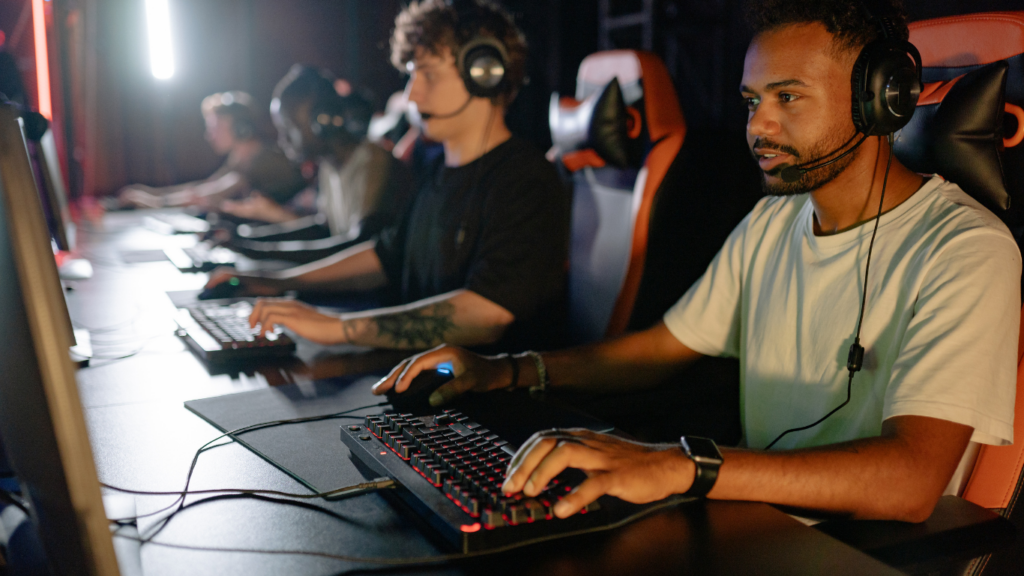The Rise of Esports and Its Appeal
Esports has rapidly emerged as a global phenomenon, gaining a massive following and reshaping entertainment. Major tournaments, like the League of Legends World Championship and The International, attract millions of viewers globally. This digital transformation turns competitive gaming into mainstream events, making it highly appealing for brands seeking fresh avenues for exposure.
The digital nature of esports offers unique engagement opportunities. Fans actively interact on platforms like Twitch and YouTube, creating communities and dedicated audiences. This interactivity contrasts with traditional sports, where spectators are typically passive viewers, providing brands with direct engagement possibilities.
Diverse demographics enhance esports’ appeal to sponsors. While the core audience comprises 18 to 34-year-olds, viewership is growing across various age groups and genders. Brands find opportunities to connect with otherwise elusive young, tech-savvy consumers. This demographic shift underscores why brands recognize esports as an effective marketing channel.
Esports’ global reach provides an expansive platform for sponsors. Unlike traditional sports, which may focus on regional markets, esports tournaments and live-streaming platforms offer brands international exposure. Companies seeking to expand their global footprint increasingly view esports sponsorships as strategic investments to enhance brand presence worldwide.
Understanding Esports Sponsorships
Esports sponsorships offer brands a way to engage with an evolving industry and its expansive audience. These partnerships present unique opportunities for both brands and the esports community.
Types of Sponsorships
Sponsorship in esports can take various forms, each offering distinct benefits to brands:
- Team Sponsorships: Support esports teams through financial investments and resources. Brands showcase logos on jerseys and gear, gaining visibility during matches.
- Event Sponsorships: Engage through the sponsorship of tournaments and events. Examples include naming rights and exclusive branding, increasing brand exposure to massive audiences.
- Platform Sponsorships: Collaborate with streaming platforms like Twitch and YouTube. Brands connect with users through ads and sponsored content.
- Product Sponsorships: Partner with teams or events to promote specific products. For instance, tech brands may provide gaming hardware to increase brand usage and loyalty.
Key Players in the Industry
The esports ecosystem features prominent entities driving sponsorship dynamics:
- Gaming Publishers: Developers like Riot Games and Valve host major tournaments. They create opportunities for sponsorships, enhancing brand visibility.
- Esports Teams: Organizations such as Team Liquid and Cloud9 attract sponsorship by partnering with brands. These teams engage fans and increase sponsor reach.
- Streaming Platforms: Providers like Twitch and YouTube facilitate brand engagement. They offer direct access to live audiences, boosting sponsor interaction.
- Event Organizers: Companies like DreamHack organize large-scale events. Their global tournaments provide prime opportunities for sponsorship involvement.
These players collaborate with brands to leverage esports’ reach, influence, and engaged audience base.
Why Brands Are Investing in Digital Sports

Esports sponsorships offer compelling reasons for brands to invest. They connect with vast audiences and drive modern marketing strategies.
Reaching a Global Audience
Brands gain access to a worldwide audience through esports. Major tournaments and streaming platforms attract viewers from diverse regions. This global reach enables companies to enhance brand recognition and appeal to an international customer base. Collaborations with esports teams and events help break into new markets and foster brand loyalty on a global scale.
Engaging Younger Demographics
Esports resonates with younger demographics, predominantly aged 18 to 34. Traditional advertising struggles with this group, but esports provides brands with a direct channel to engage and convert them. Interactive platforms like Twitch and YouTube create opportunities for personalized and dynamic marketing campaigns. Brands capture attention and build strong relationships with these young, tech-savvy consumers.
Demonstrating Innovation and Modernity
Esports aligns with innovation, appealing to brands aiming to project a modern image. By investing in esports, companies signal their commitment to digital transformation and tech-savvy audiences. Sponsorships in this arena position brands as pioneers in adapting to new trends and technologies, enhancing their reputation in a rapidly evolving digital landscape.
Successful Esports Sponsorships
Brands achieving success in esports sponsorships have effectively leveraged the digital sports space to build strong connections with target audiences. Their strategic approaches showcase the potential of esports as a lucrative marketing domain.
Case Studies of Market Leaders
- Nike and League of Legends: Nike partnered with Riot Games for the League of Legends Pro League in China. This sponsorship included the creation of training apparel and performance gear, integrating Nike’s brand with one of the most popular esports leagues worldwide. By associating with a high-profile competition, Nike expanded its reach and engaged with a massive audience.
- Red Bull and Esports Teams: Red Bull is renowned for its collaboration with various esports teams, including Dota 2’s OG team. Red Bull enhances its visibility through branding on jerseys, event sponsorships, and content partnerships. This alignment with competitive gaming elevates Red Bull as a staple lifestyle choice for gamers.
- Mercedes-Benz and ESL One: Mercedes-Benz sponsored ESL One, an esports tournament series, to tap into the tech-savvy audience drawn to competitive gameplay. As part of its strategy, Mercedes-Benz incorporated in-game elements and live event participation to strengthen its brand presence in the esports community.
- Understanding the Audience: New sponsors should focus on understanding the unique interests and behaviors of esports fans. Brands that align with fan values and community norms find better engagement in online spaces.
- Leveraging Content: Creating compelling content around sponsorships can significantly boost visibility. Sponsoring teams or players should come with strategic content plans to reach wider audiences through streams, social media, and other digital platforms.
- Flexible and Adaptive Strategies: The esports landscape is dynamic. New entrants need to be flexible, adapting strategies to ongoing trends and audience preferences, ensuring relevance and maximizing return on investment.
- Long-term Commitment: Building lasting relationships with fan communities requires consistent, long-term involvement. Sponsors that invest over time tend to cultivate deeper engagement and loyalty, leading to sustained success.
Challenges and Considerations
Brands must navigate several challenges when investing in esports sponsorships. Understanding the unique dynamics of digital sports ensures effective engagement and maximizes returns.
Measuring ROI for Sponsors
Evaluating the return on investment (ROI) from esports sponsorships involves complex metrics and analysis. Brands derive value from increased visibility, direct engagement, and enhanced brand image. However, quantifying these benefits can be challenging without standardized metrics across platforms.
To address this, companies often rely on engagement metrics, social media resonance, and brand sentiment analyses. Tracking these components helps gauge the impact of their sponsorship efforts. Identifying successful ROI indicators is essential to validate investment decisions and refine future strategies.
Navigating the Competitive Landscape
Securing a foothold in the esports ecosystem demands strategic positioning amid intense competition. As traditional brands enter this rapidly growing market, securing effective partnerships becomes critical.
Collaborating with prominent teams, events, and influencers offers exposure, but requires astute negotiation and alignment with brand values.
The fast-paced nature of esports also necessitates agile marketing strategies that adapt to shifting trends and audience preferences. Remaining competitive involves understanding fan culture, maintaining authenticity, and fostering credibility within the community.
Future Trends in Esports Sponsorships
In the evolving landscape of esports sponsorships, several trends are emerging as brands embrace digital sports. Increased integration of technology such as augmented reality (AR) and virtual reality (VR) enhances viewer experiences, creating immersive brand interactions. For example, AR overlays can display real-time stats and brand messages during live streams, promoting deeper engagement.
Sustainability is gaining prominence in esports sponsorships. Eco-conscious brands invest in green initiatives within gaming, such as sponsoring tournaments that emphasize sustainable practices or supporting esports teams that use renewable energy. This shift aligns brands with the values of environmentally aware consumers.
The rise of blockchain technology and non-fungible tokens (NFTs) is transforming monetization strategies. Sponsors can leverage NFTs for exclusive content, offering limited edition digital merchandise or collectible items tied to events, enhancing brand value and audience investment. Blockchain enhances transparency in sponsorship agreements, assuring brands of fair compensation and audience reach metrics.
Local and regional esports events are seeing a surge in sponsorship interest. While global tournaments attract vast audiences, regional competitions allow brands to connect with local communities, offering targeted engagement opportunities. This localized approach fosters community loyalty and aligns with regional audience preferences.
Data analytics and personalized marketing are becoming key components of esports sponsorships. Brands use data insights to tailor content to specific audience segments, ensuring relevant, personalized messaging. This precise approach boosts audience engagement and brand recall, especially important in a market defined by diverse fanbases.
Brands aiming to capitalize on these trends focus on authentic collaborations with esports entities. Successful partnerships respect gamer cultures and contribute to the community, ensuring sponsorships resonate with audiences and have lasting impact.





